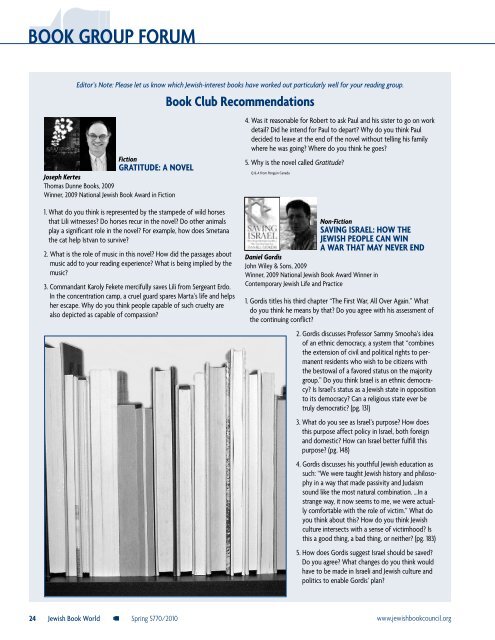reviews - Jewish Book Council
reviews - Jewish Book Council
reviews - Jewish Book Council
You also want an ePaper? Increase the reach of your titles
YUMPU automatically turns print PDFs into web optimized ePapers that Google loves.
BOOK GROUP FORUM<br />
Editor’s Note: Please let us know which <strong>Jewish</strong>-interest books have worked out particularly well for your reading group.<br />
<strong>Book</strong> Club Recommendations<br />
Fiction<br />
GRATITUDE: A NOVEL<br />
Joseph Kertes<br />
Thomas Dunne <strong>Book</strong>s, 2009<br />
Winner, 2009 National <strong>Jewish</strong> <strong>Book</strong> Award in Fiction<br />
1. What do you think is represented by the stampede of wild horses<br />
that Lili witnesses? Do horses recur in the novel? Do other animals<br />
play a significant role in the novel? For example, how does Smetana<br />
the cat help Istvan to survive?<br />
2. What is the role of music in this novel? How did the passages about<br />
music add to your reading experience? What is being implied by the<br />
music?<br />
3. Commandant Karoly Fekete mercifully saves Lili from Sergeant Erdo.<br />
In the concentration camp, a cruel guard spares Marta’s life and helps<br />
her escape. Why do you think people capable of such cruelty are<br />
also depicted as capable of compassion?<br />
4. Was it reasonable for Robert to ask Paul and his sister to go on work<br />
detail? Did he intend for Paul to depart? Why do you think Paul<br />
decided to leave at the end of the novel without telling his family<br />
where he was going? Where do you think he goes?<br />
5. Why is the novel called Gratitude?<br />
Q & A from Penguin Canada<br />
Non-Fiction<br />
SAVING ISRAEL: HOW THE<br />
JEWISH PEOPLE CAN WIN<br />
A WAR THAT MAY NEVER END<br />
Daniel Gordis<br />
John Wiley & Sons, 2009<br />
Winner, 2009 National <strong>Jewish</strong> <strong>Book</strong> Award Winner in<br />
Contemporary <strong>Jewish</strong> Life and Practice<br />
1. Gordis titles his third chapter “The First War, All Over Again.” What<br />
do you think he means by that? Do you agree with his assessment of<br />
the continuing conflict?<br />
2. Gordis discusses Professor Sammy Smooha’s idea<br />
of an ethnic democracy, a system that “combines<br />
the extension of civil and political rights to permanent<br />
residents who wish to be citizens with<br />
the bestowal of a favored status on the majority<br />
group.” Do you think Israel is an ethnic democracy?<br />
Is Israel’s status as a <strong>Jewish</strong> state in opposition<br />
to its democracy? Can a religious state ever be<br />
truly democratic? (pg. 131)<br />
3. What do you see as Israel’s purpose? How does<br />
this purpose affect policy in Israel, both foreign<br />
and domestic? How can Israel better fulfill this<br />
purpose? (pg. 148)<br />
4. Gordis discusses his youthful <strong>Jewish</strong> education as<br />
such: “We were taught <strong>Jewish</strong> history and philosophy<br />
in a way that made passivity and Judaism<br />
sound like the most natural combination. ...In a<br />
strange way, it now seems to me, we were actually<br />
comfortable with the role of victim.” What do<br />
you think about this? How do you think <strong>Jewish</strong><br />
culture intersects with a sense of victimhood? Is<br />
this a good thing, a bad thing, or neither? (pg. 183)<br />
5. How does Gordis suggest Israel should be saved?<br />
Do you agree? What changes do you think would<br />
have to be made in Israeli and <strong>Jewish</strong> culture and<br />
politics to enable Gordis’ plan?<br />
24 <strong>Jewish</strong> <strong>Book</strong> World Spring 5770/2010 www.jewishbookcouncil.org<br />
Zion Ozeri


